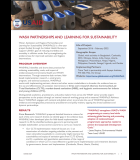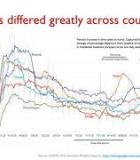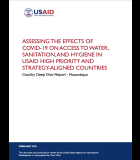Coastal City Adaptation Project (CCAP)
Mozambique’s coastal cities serve as economic hubs and primary drivers of the country’s development. These coastal cities house much of the country’s key infrastructure and productive workforce, which are vital to sustaining the strong economic growth levels Mozambique has enjoyed over the past few years. But they are also vulnerable to sea level rise and projected changes in extreme events. Due to their exposure to climate change and a generalized lack of access to resources for adaptation, the Government of Mozambique’s (GOM) National Institute for Disaster Management (INGC) and international development agencies have identified Mozambique’s coastal cities as among the most vulnerable in Africa.
Extreme climate events such as cyclones and tropical storms already impose large costs on Mozambican cities. Climate change will worsen the toll by causing sea levels to rise, inundating unprotected low-lying areas. Climate change is also likely to increase the frequency and severity of high-rainfall storms and the most intense cyclones, leading to more destructive floods and damaging or destroying coastal ecosystems and livelihoods. These recurring events will have serious impacts on urban infrastructure and the health of local populations and biodiversity.
Activity Description
A wide array of evidence persuasively demonstrates that proactive investments in adaptation can cost-effectively avert a significant portion of the projected costs of climate change while yielding substantial co-benefits. To facilitate this process in vulnerable Mozambican coastal communities, CCAP is working with municipal governments to increase understanding of urban adaptation issues and increase the application of management options for urban adaptation, with particular emphasis on the most vulnerable communities within the city limits. CCAP is also engaging with other national agencies, academia and an array of civic organizations to increase climate awareness and the technical expertise of future urban planners and municipal authorities, and to facilitate local adaptive measures.
Expected Outcomes
- Increased understanding of urban adaptation issues by municipal authorities and increased application of adaptation-relevant management options
- Decreased vulnerability to climate change for the population of select coastal cities
- Increased local capacity for managing resources to adapt to climate change
- Synthesis and dissemination of lessons learned regarding coastal adaptation in urban settings, which can be applied by other coastal cities and future USAID urban adaptation efforts.





